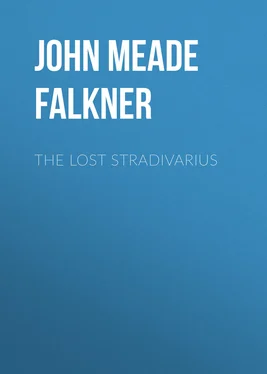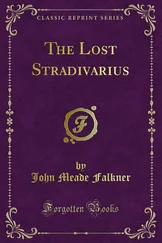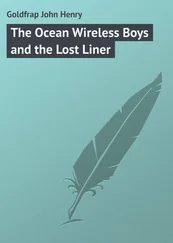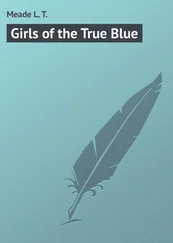John Meade Falkner - The Lost Stradivarius
Здесь есть возможность читать онлайн «John Meade Falkner - The Lost Stradivarius» — ознакомительный отрывок электронной книги совершенно бесплатно, а после прочтения отрывка купить полную версию. В некоторых случаях можно слушать аудио, скачать через торрент в формате fb2 и присутствует краткое содержание. Жанр: foreign_sf, foreign_antique, foreign_prose, на английском языке. Описание произведения, (предисловие) а так же отзывы посетителей доступны на портале библиотеки ЛибКат.
- Название:The Lost Stradivarius
- Автор:
- Жанр:
- Год:неизвестен
- ISBN:нет данных
- Рейтинг книги:4 / 5. Голосов: 1
-
Избранное:Добавить в избранное
- Отзывы:
-
Ваша оценка:
- 80
- 1
- 2
- 3
- 4
- 5
The Lost Stradivarius: краткое содержание, описание и аннотация
Предлагаем к чтению аннотацию, описание, краткое содержание или предисловие (зависит от того, что написал сам автор книги «The Lost Stradivarius»). Если вы не нашли необходимую информацию о книге — напишите в комментариях, мы постараемся отыскать её.
The Lost Stradivarius — читать онлайн ознакомительный отрывок
Ниже представлен текст книги, разбитый по страницам. Система сохранения места последней прочитанной страницы, позволяет с удобством читать онлайн бесплатно книгу «The Lost Stradivarius», без необходимости каждый раз заново искать на чём Вы остановились. Поставьте закладку, и сможете в любой момент перейти на страницу, на которой закончили чтение.
Интервал:
Закладка:
John Meade Falkner
The Lost Stradivarius
THE AUTHOR
John Meade Falkner was a remarkable character, as he was not only a scholar and a writer, but a captain of industry as well. Born in 1858, the son of a clergyman in Wiltshire, he was educated at Marlborough and Hertford College, Oxford. On leaving the university, he became tutor to the sons of Sir Andrew Noble, then vice-chairman of the Armstrong-Whitworth Company; and his ability so much impressed his employer that in 1885 he was offered a post in the firm. Without connections or influence in industrial circles, and solely by his intellect, he rose to be a director in 1901, and finally, in 1915, chairman of this enormous business. He was actually chairman during the important years 1915-1920, and remained a director until 1926.
His intellectual energy was so great that throughout his life he found time for scholarship as well as business. He travelled for his firm in Europe and South America; and in the intervals of negotiating with foreign governments studied manuscripts wherever he found a library. His researches in the Vatican Library were of special importance, and in connection with them he received a gold medal from the Pope; he was also decorated by the Italian, Turkish and Japanese governments.
His scholastic interests included archæology, folklore, palæography, mediæval history, architecture and church music; and he was a collector of missals. Towards the end of his life he was made an Honorary Fellow of Hertford College, Oxford, Honorary Reader in Palæography to Durham University, and Honorary Librarian to the Chapter Library of Durham Cathedral, which he left one of the best cathedral libraries in Europe. He died at Durham in 1932.
Apart from The Lost Stradivarius , Falkner was the author of two other novels, The Nebuly Coat (1903—also published in Penguin Books) and Moonfleet (1898). He also wrote a History of Oxfordshire, handbooks to that county and to Berkshire, historical short stories, and some mediævalist verse.
Letter from MISS SOPHIA MALTRAVERS to her Nephew, SIR EDWARD MALTRAVERS, then a Student at Christ Church, Oxford.
13 Pauncefort Buildings, Bath, Oct. 21, 1867.
MY DEAR EDWARD,
It was your late father's dying request that certain events which occurred in his last years should be communicated to you on your coming of age. I have reduced them to writing, partly from my own recollection, which is, alas! still too vivid, and partly with the aid of notes taken at the time of my brother's death. As you are now of full age, I submit the narrative to you. Much of it has necessarily been exceedingly painful to me to write, but at the same time I feel it is better that you should hear the truth from me than garbled stories from others who did not love your father as I did.
Your loving Aunt,
SOPHIA MALTRAVERS
To Sir Edward Maltravers, Bart.
"A tale out of season is as music in mourning."
MISS SOPHIA MALTRAVERS' STORY
CHAPTER I
Your father, John Maltravers, was born in 1820 at Worth, and succeeded his father and mine, who died when we were still young children. John was sent to Eton in due course, and in 1839, when he was nineteen years of age, it was determined that he should go to Oxford. It was intended at first to enter him at Christ Church; but Dr. Sarsdell, who visited us at Worth in the summer of 1839, persuaded Mr. Thoresby, our guardian, to send him instead to Magdalen Hall. Dr. Sarsdell was himself Principal of that institution, and represented that John, who then exhibited some symptoms of delicacy, would meet with more personal attention under his care than he could hope to do in so large a college as Christ Church. Mr. Thoresby, ever solicitous for his ward's welfare, readily waived other considerations in favour of an arrangement which he considered conducive to John's health, and he was accordingly matriculated at Magdalen Hall in the autumn of 1839.
Dr. Sarsdell had not been unmindful of his promise to look after my brother, and had secured him an excellent first-floor sitting-room, with a bedroom adjoining, having an aspect towards New College Lane.
I shall pass over the first two years of my brother's residence at Oxford, because they have nothing to do with the present story. They were spent, no doubt, in the ordinary routine of work and recreation common in Oxford at that period.
From his earliest boyhood he had been passionately devoted to music, and had attained a considerable proficiency on the violin. In the autumn term of 1841 he made the acquaintance of Mr. William Gaskell, a very talented student at New College, and also a more than tolerable musician. The practice of music was then very much less common at Oxford than it has since become, and there were none of those societies existing which now do so much to promote its study among undergraduates. It was therefore a cause of much gratification to the two young men, and it afterwards became a strong bond of friendship, to discover that one was as devoted to the pianoforte as was the other to the violin. Mr. Gaskell, though in easy circumstances, had not a pianoforte in his rooms, and was pleased to use a fine instrument by D'Almaine that John had that term received as a birthday present from his guardian.
From that time the two students were thrown much together, and in the autumn term of 1841 and Easter term of 1842 practised a variety of music in John's rooms, he taking the violin part and Mr. Gaskell that for the pianoforte.
It was, I think, in March 1842 that John purchased for his rooms a piece of furniture which was destined afterwards to play no unimportant part in the story I am narrating. This was a very large and low wicker chair of a form then coming into fashion in Oxford, and since, I am told, become a familiar object of most college rooms. It was cushioned with a gaudy pattern of chintz, and bought for new of an upholsterer at the bottom of the High Street.
Mr. Gaskell was taken by his uncle to spend Easter in Rome, and obtaining special leave from his college to prolong his travels; did not return to Oxford till three weeks of the summer term were passed and May was well advanced. So impatient was he to see his friend that he would not let even the first evening of his return pass without coming round to John's rooms. The two young men sat without lights until the night was late; and Mr. Gaskell had much to narrate of his travels, and spoke specially of the beautiful music which he had heard at Easter in the Roman churches. He had also had lessons on the piano from a celebrated professor of the Italian style, but seemed to have been particularly delighted with the music of the seventeenth-century composers, of whose works he had brought back some specimens set for piano and violin.
It was past eleven o'clock when Mr. Gaskell left to return to New College; but the night was unusually warm, with a moon near the full, and John sat for some time in a cushioned window-seat before the open sash thinking over what he had heard about the music of Italy. Feeling still disinclined for sleep, he lit a single candle and began to turn over some of the musical works which Mr. Gaskell had left on the table. His attention was especially attracted to an oblong book, bound in soiled vellum, with a coat of arms stamped in gilt upon the side. It was a manuscript copy of some early suites by Graziani for violin and harpsichord, and was apparently written at Naples in the year 1744, many years after the death of that composer. Though the ink was yellow and faded, the transcript had been accurately made, and could be read with tolerable comfort by an advanced musician in spite of the antiquated notation.
Читать дальшеИнтервал:
Закладка:
Похожие книги на «The Lost Stradivarius»
Представляем Вашему вниманию похожие книги на «The Lost Stradivarius» списком для выбора. Мы отобрали схожую по названию и смыслу литературу в надежде предоставить читателям больше вариантов отыскать новые, интересные, ещё непрочитанные произведения.
Обсуждение, отзывы о книге «The Lost Stradivarius» и просто собственные мнения читателей. Оставьте ваши комментарии, напишите, что Вы думаете о произведении, его смысле или главных героях. Укажите что конкретно понравилось, а что нет, и почему Вы так считаете.












